#the newspaper uganda
Explore tagged Tumblr posts
Text
I can't stop thinking about the recent cases of horrible abuse of women in France, South Korea, Uganda and India, so this fragment of Pauline Harmange's "I Hate Men", about why misandry is actually a healthy and reasonable response, is always on my mind:
If misandry is a characteristic of someone who hates men, and misogyny that of someone who hates women, it has to be conceded that in reality, the two concepts are not equal, either in terms of the dangers posed to their targets or the means used to express them. Misandry and misogyny cannot be compared, quite simply because the former exists only in reaction to the latter.
You’d literally have to have never looked beyond the end of your nose –or alternatively to be possessed of exceptional bad faith – to deny point blank that the violence women suffer is, in the huge majority of cases, perpetrated by men. This isn’t a matter of opinion, it’s a fact. The reason society is patriarchal is because there are men who use their male privilege to the detriment of the other half of the population. Some of this violence is insidious, background noise in the daily lives of women, so pernicious that we grow up with the impression that it’s the norm in male/female relationships. Other kinds of violence are so shocking that they make the headlines in national newspapers.
In 2017 in France, 90 per cent of the people who received death threats from their partners were women, while 86 per cent of those murdered by their partner or ex-partner were also women. Of the sixteen women who killed their partner, at least eleven, that is, 69 per cent of them, had themselves been victims of domestic violence. In 2019, 149 women were murdered by their partner or their former partner. In 2018, 96 per cent of those who received a prison sentence for domestic violence were men, and 99 per cent of those sentenced for sexual violence were men.
It’s not only women who are the victims of sexual attacks and rape, though it’s hard to find statistics of sexual attacks on men. There’s an enormous taboo when it comes to talking about sexual violence perpetrated against men, who suffer the full force of sexist stereotypes that imply that aman cannot be raped, since supposedly they’re always up for sex. It’s also very difficult for men to talk about sexual trauma. Society expects them to be strong and virile: nothing can be forced on them – and if it is, they aren’t ’real’ men.
A significant number of rapes are committed against minors, both male and female, and here too, the perpetrators are overwhelmingly men. In fact, whatever the sex or age of the victim of sexual harassment or violence– whether male or female, child or adult – it is vital to emphasise that the vast majority of those responsible for such violence are men.
[...] There are plenty of reasons to dislike men, if you think about it. Reasons backed up by facts. Why do men hate women? During the thousands of years that men have benefited from their dominant social position, what did we do – what have we done – to deserve their violence?
Misandry has a target, but it doesn’t have a list of victims whose morbid tally is totted up on almost a daily basis. We don’t injure or kill men, we don’t prevent them from getting a job or following whatever their passion is, or dressing as they wish, or walking down the street after dark, or expressing themselves however they see fit. And when someone does give themselves the right to impose such things on men, that person is always a man, and it still falls within the heteropatriarchal system
We misandrists stay in our lane. We might hate men, but at best we put up with them, frostily, because they’re everywhere and we don’t have any choice (incredible but true: it’s possible to hate someone without having an irrepressible urge to kill them). At worst we stop inviting them into our lives – or at least we make a drastic selection beforehand. Our misandry scares men, because it’s the sign that they’re going to have to start meriting our attention. Having relationships with men isn’t something we owe them,a duty, but, as in every balanced relationship, all the parties involved have to make an effort to treat one another with respect.
As long as there are misogynistic men who don’t give a damn, and a culture that condones and encourages them, there will be women who are so fed up they refuse to bear the brunt of exhausting or toxic relationships.
83 notes
·
View notes
Photo
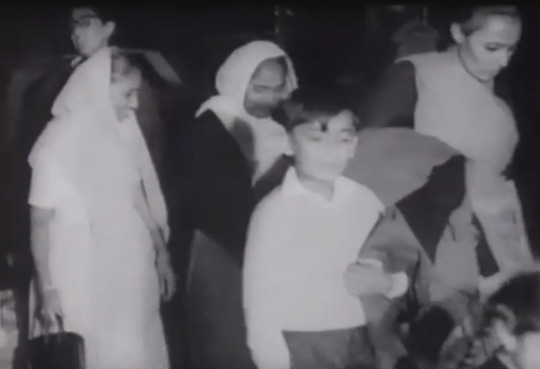
On this day, 1 March 1968, the racist Commonwealth Immigrants Act 1968 came into force in the UK. In Britain's East African colonies after independence, like Uganda and Kenya, the new governments were pursuing various policies to Africanise, which threatened tens of thousands of South Asian settlers: mostly British passport-holders. So the Labour government passed the act to prevent them coming to Britain, despite the fact that the country had net emigration at that time. Labour claimed that the law wasn't racial, but secret papers released decades later showed that it purposely targeted "coloured immigrants," and cabinet was even advised that the bill would breach international law. A confidential memo to prime minister Harold Wilson said that they could argue "the Asian community in East Africa are not nationals of this country in any racial sense and that the obligations imposed, for example, by the European Convention on Human Rights do not therefore apply." Though most Conservative MPs voted for the law, even the conservative Times newspaper described it as "probably the most shameful measure that Labour members have ever been asked by their whips to support." Tory Lord Ian Gilmour, who opposed the bill, described its purpose very straightforwardly to journalist Mark Lattimer: “to keep the Blacks out." (At the time in the UK all people of colour were considered "Black.") In our podcast episodes 33-34 we talk about the experiences of Asian migrants in Britain and how they fought against racism: https://workingclasshistory.com/2019/09/18/e28-29-asian-youth-movements-in-bradford/ Pictured: Kenyan Asian refugees at this time https://www.facebook.com/workingclasshistory/photos/a.296224173896073/2220765034775301/?type=3
133 notes
·
View notes
Text

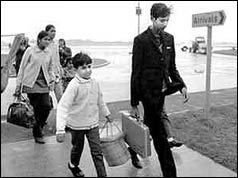
On 18th September 1972, BBC News reported that the first 193 Ugandan refugees, fleeing persecution by the country’s military dictatorship, had arrived at Stansted Airport, Essex. Over half of the arrivals had British passports, and housing and immediate needs would be overseen by the Ugandan Resettlement Board.
Uganda’s Asian community, numbering around 55 000, many of whom ran family businesses and small enterprise, were ordered in August 1972 to leave the country within 90 days by President Idi Amin. Amin had publicly denounced Ugandan Asians as ‘bloodsuckers’, threatening that any who had not left by the arbitrary deadline of November 8th would be interned in military detention camps.
Many of the initial flight of refugees had endured frightening experiences prior to their departure from Uganda, at the hands of Amin’s troops. "On the way to the airport the coach was stopped by troops seven times, and we were all held at gun point," one refugee told reporters. Another stated that he had been robbed of personal valuables and Ugandan currency on the way to Entebbe airport.
News reports at the time cited some opposition within the UK over the acceptance of the Ugandan Asians. The Leicester local authority mounted a newspaper campaign urging refugees not to come to their region seeking jobs and housing. The BBC asserted that, in hindsight, the resettlement programme was seen as ‘a success story for British Immigration’.
The loss of the hardworking and successful Ugandan Asian community devastated Uganda’s agriculture, manufacturing and commerce. Idi Amin was deposed in 1979 and died in Jeddah in 2003, having been responsible for the deaths of as many as 300 000 Ugandan civilians during his reign of terror as President. In 1991, Ugandan President Yoweri Museveni invited the expelled community to return home to help rebuild the economy.
The Wilson Labour government also had to grapple with a refugee crisis from a former African colony.
In February 1968, BBC news reported;
"…Another 96 Indians and Pakistanis from Kenya have arrived in Britain, the latest in a growing exodus of Kenyan Asians fleeing from laws which prevent them making a living…"
Many Asian people living in Kenya had not taken up Kenyan citizenship following the country’s independence from Britain in 1963, but possessed British passports. Under Kenya’s Africanisation policy, non-citizens required work permits, and were being removed from employment in favour of Kenyan nationals. There was growing public demand for laws to prevent non-citizens from owning businesses or even operating as street and market traders. As a result, British passport holders were leaving Kenya at the rate of 1000 per month, leaving a huge deficit in skills and experience within the business community and civil service.
Fearing a backlash over the large numbers of Asian immigrants, Home Secretary, and future Prime Minister, James Callaghan, rushed through the Commonwealth Immigration Act, which made it a requirement that prospective immigrants must have a 'close connection' with Britain.
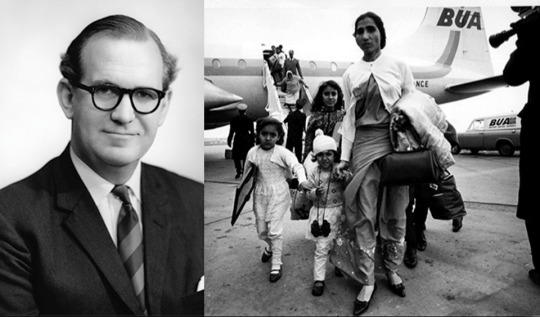
This led to disagreement in Cabinet, with Secretary of State for Commonwealth Affairs, George Thomson (1921-2008) arguing;
"…To pass such legislation would be wrong in principle, clearly discrimination on the grounds of colour, and contrary to everything we stand for…"
In 1971, the Heath government made further legislative changes that would mean that (some) immigrants from Commonwealth countries would be treated no more favourably than those from the rest of the world, and that tightened restrictions on those who stayed by linking work permits to a specific job and location, requiring registration with police, and reapplication to stay in Britain each 12 months.
The Patrial Right of Abode lifted all restrictions on those immigrants with a direct ancestral connection with Britain.
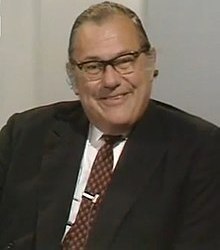
Home Secretary Reginald Maudling (later famous for being smacked in the face by Irish MP Bernadette Devlin, and for having to resign over a corruption scandal linked with disgraced property developer John Poulson) denied that this was, in effect, a 'colour bar', telling the BBC;
"…Of course they are more likely to be white because we have on the whole more whites than coloureds in this country, but there is no colour bar involved…"
Unsurprisingly, not everyone was convinced.
Vishna Sharma, Executive Secretary of the Joint Council for the Welfare of Immigrants, described the bill to BBC News as, "basically racially discriminatory, repressive and divisive," and added, "It will create divisions amongst the Commonwealth citizens already living in this country on patrial and non-patrial basis. It will create day-to-day bureaucracy and interference on people living in this country. It will create more hardship for people wanting to enter into this country."
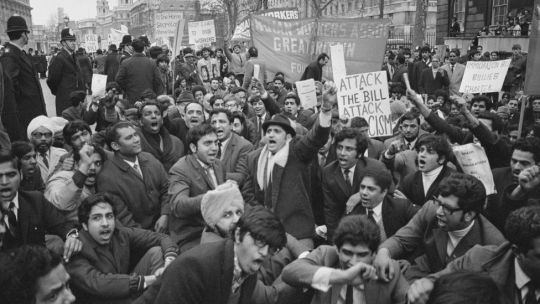
(Source; BBC reporting and history.com. Photo Credits; BBC News)
#social history#uk politics#working class history#social justice#uk government#human rights#uk history#british culture#society#history#race relations#immigration
27 notes
·
View notes
Text
A Study of the Heart and Brain (Book 2) Chapter Eight
Father Figure! Sherlock Holmes x Teen! Reader
Chapter Eight: Gigantic Hound
Summary: A man comes with an interesting case to (Y/N) and Sherlock, and they go on a trip to investigate.
A few months had passed since the case with Irene, and Sherlock, (Y/N), and John had returned to their usual routine. By “usual,” that mean John putting up with Sherlock and (Y/N)’s boredom and the nonsense that came with it until an interesting case came up. It didn't help that Sherlock's mind was buzzing with the truth of (Y/N)'s parentage, and he needed a case to take his brain off it, or he'd go mad. He could hear Moriarty's words echoing within him, and his mind could come up with the most horrible ways Moriarty would use (Y/N) against him. He knew how capable Moriarty was of hurting people. He didn't want them to hurt. he wanted them safe. All in all, the stress was a burden, and it was driving him mad.
“Nothing?” said Sherlock grumpily as John flipped through the newspaper, trying to find a topic to excite the bored detective.
“Military coup in Uganda,” suggested John.
“Hm.” Sherlock found it boring.
“Another photo of us with the hats,” said (Y/N) distastefully.
“Oh, um, Cabinet reshuffle,” said John.
(Y/N) groaned. “Nothing interesting.”
John sighed in exasperation. “It’s just because you two are bored by basically everything.”
“Oh, John, I envy you so much,” said Sherlock, sighing dramatically.
“You envy me?” asked John.
“Your mind���it’s so placid, straightforward. Mine and (Y/N)’s —they’re like an engine, racing out of control; a rocket tearing itself to pieces trapped on the launch pad,” bemoaned Sherlock.
“We need a case!” said (Y/N), turning over in frustration on the couch.
“You two solved one! By harpooning a pig!” cried John. Bloody drama queens, honestly.
“Yes, but we need the next one!” said Sherlock.
“Is there nothing on the website?” sighed John. He felt like a babysitter.
“Oh, yes, a fun note from a child,” sighed Sherlock.
“ ‘Dear Mr. Sherlock Holmes and (Y/N) (L/N). I can’t find my bunny, Bluebell, anyway. Please please please can you help?’ ” recited (Y/N). They glanced at John. “And apparently, the night before Bluebell disappeared, it turned luminous. ‘Like a fairy,’ according to Kirsty. Then, poof! Bluebell was gone. Hutch locked, no sign of forced entry.”
“Am I going to have to hear you complain forever?” grumbled John.
“That or Cluedo,” said (Y/N).
“Oh, no! We’re not playing that again!” said John vehemently.
“Why not?” asked Sherlock.
“Because I don’t hear you two bicker over whether the victim did it or not. Or whether it’s even in the rules,” said John.
“The rules are wrong,” said (Y/N), crossing their arms.
The doorbell rang downstairs, and the trio stopped moving.
“Single ring,” said John.
“Maximum pressure just under the half second,” said Sherlock.
“Client,” summarized (Y/N). “Finally.”
l
Their new client, Henry Knight, sat in the client chair. (Y/N) hadn’t bothered to move from their couch, Sherlock sat in his armchair, and John sat in his. Henry had brought a documentary on his home, Dartmoor, and himself that now played on the TV. A strange opener for a case, but (Y/N) found that strange usually ended up interesting.
“Dartmoor. It’s always been a place of myth and legend, but is there something else lurking out here—something very real?” asked the reporter. “Because Dartmoor’s also home to one of the government’s most secret of operations—the chemical and biological weapons research center which is said to be even more sensitive than Porton Down. Since the end of the Second World War, there’ve been persistent stories about Baskerville experiments: genetic mutations, animals grown for the battlefield. There are many that believe within this compound, in the heart of this ancient wilderness, there are horrors beyond imagining. But the real question is, are all of them still inside?”
The setting switched to Henry sitting indoors and speaking to an offscreen interviewer. “I was just a kid. It-it was on the moor,” he said. The scene cut away to a child’s drawing of a gigantic dog with red eyes.” The caption read: Henry’s drawing (Aged 9).
“It was dark, but I know what I saw. I know what killed my father,” said Henry ominously.
The television switched off. Sherlock and (Y/N) were bored of the documentary. They wanted facts from Henry, not curated moments from TV.
“What did you see?” asked Sherlock.
“Oh. I…I was just about to say,” said Henry, pointing at the dark screen.
“Yeah, in an edited TV interview,” said (Y/N). “We want to hear it from you.”
“Yes, sorry, yes, of course. ‘Scuse me,” said Henry, wiping his nose with a napkin.
Anxious, thought (Y/N). Likely trauma-induced.
“In your own time,” said John.
“But quite quickly,” said Sherlock, wanting to get to the case and skip the boring emotional part.
“Do you know Dartmoor, Mr. Holmes?” asked Henry.
“No,” said Sherlock.
“It’s an amazing place. It’s like nowhere else. It’s sort of…bleak but beautiful,” said Henry. “We used to go for walks, after my mum died, my dad and me. Every evening we’d go out on the moor.”
“Yes, good. Skipping to the night that your father was violently killed. Where did that happen?” questioned Sherlock.
“There’s a place—it’s…it’s sort of a local landmark called Dewer’s Hollow. That’s an ancient name for the Devil,” said Henry.
“Did you see the devil that night?” asked (Y/N), cocking their head.
He looked at them, a haunted air in his eyes. “Yes…It was huge. Coal-black fur with red eyes. It got him, tore at him, tore him apart.” Henry swallowed and fidgeted nervously. “I can’t remember anything else. They found me the next morning, just wandering on the moor. My dad’s body was never found.”
“Dog? Wolf?” hypothesized (Y/N).
“Or a genetic experiment,” said Sherlock sarcastically.
“Are you laughing at me?” asked Henry.
“Why, are you joking?” asked Sherlock.
“My dad was always going on about the things they were doing at Baskerville, about the type of monsters they were breeding there. People used to laugh at him. At least the TV people took me seriously,” muttered Henry.
“Probably did wonders for Devon tourism,” remarked (Y/N).
“Yeah…” said John, shifting as he realized Sherlock and (Y/N) were going down the not-so-nice questioning route. “Henry, whatever did happen to your father, it was twenty years ago. Why come to us now?”
“I’m not sure you can help me, Mr. Holmes, since you find it all so funny,” said Henry, huffing and standing up to leave.
“Last night,” said (Y/N), crossing their arms.
Henry paused. “How…How do you know?”
John sighed. Here we go again.
“You came up from Devon on the first available train this morning. You had a disappointing breakfast. Black coffee, too. And right now you’re anxious for your first cigarette of the day,” said (Y/N). “Trust me, we can help.”
“How on earth did you know all that?” cried Henry.
“Punched out holes where your tickets been checked,” said Sherlock. “The train napkin you used to mop up the spilled coffee, the strength of the stain shows you didn’t take milk. There are traces of ketchup on it and around your lips and your sleep. Cooked breakfast or the nearest thing those trains can manage. Probably a sandwich,”
“How did you know it was disappointing?” asked Henry, still bewildered.
“It’s a train breakfast. They all are,” said (Y/N), shrugging.
“Then there’s the nicotine stains on your fingers…your shaking fingers,” continued Sherlock. “No chance to smoke on the train, no time to roll one before you got a cab here. It’s just after 9:15. You’re desperate. The first train from Exeter to London leaves at 5:46 am.”
“You took the earliest, so something must have happened last night. Were we wrong?” asked (Y/N), cocking their head appraisingly.
“No, you’re right. You’re completely, exactly right. Blood hell, I heard you two were quick,” said Henry, nervously rolling a cigarette.
“It’s our job,” said (Y/N).
“Um, Henry, your parents both died and you were, what, seven years old?” began John tentatively.
“I know that,” said Henry.
“That must be quite traumatic. Have you ever thought that maybe you invented this story to account for it?” finished John.
“That’s what Dr. Mortimer says,” said Henry.
“Who?” asked John.
“His therapist,” said Sherlock and (Y/N).
“My therapist,” said Henry.
All three spoke simultaneously.
“Obviously,” added Sherlock.
“Louise Mortimer. She’s the reason I came back to Dartmoor. She thinks I have to face my demons,” said Henry.
“What happened when you went back to Dewer’s Hollow last night, Henry?” asked (Y/N), raising an eyebrow. “You went there on Dr. Mortimer’s advice, and now you want the help of detectives. What happened?”
“It’s a strange place, the Hollow. Makes you feel so cold inside, so afraid,” murmured Henry.
“Yes, if I wanted poetry, I’d read John’s emails to his girlfriends. Much funnier,” said Sherlock. “Now, what did you see?”
“Footprints on the exact spot where I saw my father torn apart,” said Henry.
Would it kill him to be more specific? thought (Y/N). “What type of footprints?” There was more to it, they could tell.
Henry swallowed. “They were the footprints of a gigantic hound.” He was nearly hesitant to say it, knowing how ridiculous it was.
“Say that again,” said Sherlock, leaning forward.
“I found the footprints, they were—” began Henry.
“No, no, no, your exact words,” interrupted Sherlock. “Repeat your exact words from a minute ago, precisely as you said them.”
“They were the footprints of a gigantic…hound,” repeated Henry.
“We’ll take the case,” said (Y/N). Like Sherlock, they had realized this was a very specific term to use, “hound.” That, and this was the second animal that was odd. Bluebell was the first, and little Kirsty was from the same area. This was promising indeed.
“Sorry, what?” asked John. He was surprising something so…crazy had piqued their interest.
“Thank you for bringing this to our attention. It’s very promising,” said Sherlock. “Baskerville…You’ve heard of it, right, John?”
“Vaguely. It’s very hush-hush,” said John.
“Sounds like a good place to start,” said (Y/N).
“Ah! You’ll come down, then?” said Henry eagerly.
“Yes, yes,” said Sherlock, waving a hand. “You go on ahead, Henry. We’ll follow later.”
“Twenty-year-old disappearance, a monstrous hound? I wouldn’t miss this for the world!” cried Sherlock.
l
After arriving in Dartmoor and Devon, Sherlock, (Y/N), and John checked out the countryside. Using binoculars, they spied out Baskerville and confirmed the minefield warnings around them. Afterwards, they headed to Grimpen Village where the Cross Keys Inn kept its doors open to tourists and travelers.
“Three times a day, tell your friends. Tell anyone! Don’t be strangers and remember…stay away from the moor at night if you value your lives!” said a man trying to drum up interest in his tours.
(Y/N) just rolled their eyes as they walked with Sherlock and John. After a quick check in, the innkeeper, Gary, grabbed their keys.
“Here you go. Single room for you,” said Gary, handing a key to John. “And then a two bed room for you and your kid.” He handed a second key to Sherlock. Then, John ordered a drink, and he stole a receipt labeled “Undershaw Meat Suppliers.”
“There you go,” said Gary, handing back the drink.
“Thanks,” said John as Sherlock got up to circle the room and make deductions. “I couldn’t help noticing on the map of the moor, a skull and crossbones.”
“Oh, that, aye,” said Gary.
“Pirates?” asked John.
“Eh? No, no. The Great Grimpen Minefield, they call it,” explained Gary,
“Oh, right,” said John.
“It’s not what you think. It’s the Baskerville testing site. It’s been going for eighty odd years. I’m not sure anyone really knows what’s there anymore,” said Gary.
“More than just explosives?” asked (Y/N).
Gary nodded. “Break into that place, and, if you’re lucky, you just get blown up, so they say…in case you’re planning on a nice wee stroll.”
“I’ll remember,” said John grimly.
“Aye. No, it buggers up tourism a bit, so thank God for the demon hound! Did you two see that show, the documentary?” asked Gary.
“Unfortunately,” murmured (Y/N).
“Aye, God bless Henry Knight and his monster from Hell,” said Gary jovially.
(Y/N) leaned forward and put on the “wide-eyed-curious-teen” look. “Have you ever seen it? The hound, I mean? I love this supernatural stuff.”
“Me? No,” said Gary. He nodded to the tour guide from earlier. “But Fletcher has. Can give you a right good story. He runs the Monster Walks for the tourists. He’s seen it.”
“Oh, really? Thanks!” said (Y/N) with a bright-eyed smile.
They jumped down from the barstool and went over to Sherlock. “Dad!” they said eagerly. “Gary said the tour guide, Fletcher, has seen the hound? Can we go find out?”
Sherlock effortlessly went along with their charade. “Of course.” Together, they walked over to Fletcher, who had ordered a drink. “Excuse me, is it true?”
Fletcher turned. “What’s true?”
“That you’ve seen the hound,” said (Y/N), still playing their part.
“Maybe,” said Fletcher.
“Do you have proof? I love this type of stuff and want to know,” said (Y/N) eagerly.
“Well, uh, I did,” said Fletcher. With an eager audience, he was willing to speak. “Once month ago, up at the hollow. It was foggy, mind—couldn’t make out a thing.”
“I see. No witnesses, I suppose,” said Sherlock.
“Wait!” said Fletcher, pulling out his phone. He found a picture and zoomed in. “There.” In the darkness of the photo, a four-legged something stood in the distance. Unfortunately, it’s distinct size or shape couldn’t be made out.
“I can’t really tell what it is…” huffed (Y/N), “upset” at not having better proof.
“Well, that’s not all. People don’t like going up there, you know—to the Hollow. Gives them a…bad sort of feeling,” said Fletcher.
“Is rumors of being haunted supposed to be proof?” asked Sherlock doubtfully.
“Nah, don’t be stupid, nothing like that, but I reckon there is something out there—something from Baskerville, escaped,” said Fletcher.
“A super-dog? A terrible hound?” asked (Y/N).
“Maybe. God knows what they’ve been spraying on us all these years or putting in the water. I wouldn’t trust ‘em as far as I could spit,” said Fletcher.
“Is that photo the best you’ve got?” questioned Sherlock.
Fletcher hesitated before continuing, eager to impress. “I had a mate once who worked for the MOD. One weekend we were meant to go fishin’, but he never showed up—well, not til late. When he did, he was white as a sheet. I can see him now. I’ve seen things today, Fletch, he said, that I never want to see again. Terrible things. He’d been sent to some secret army place—Porton Down, maybe; maybe Baskerville, or somewhere else. In the labs there—in the really secret labs—he’d said he’d seen…terrible things. Rats as big as dogs, he said, and dogs…dogs the size of horses.” He reached into his bag and pulled out a caste of a pawprint. A sin inch long paw print.
Sherlock and (Y/N) raised an eyebrow in surprise. This was certainly an interesting turn of events.
“Wow. That’s so cool. Can I take a picture?” said (Y/N) eagerly. Fletcher nodded, and they snapped a photo of the pawprint for later. “Thanks!”
Sherlock and (Y/N) walked away and glanced at each other. It seemed the next step would be to get into Baskerville.
“Did you bring Mycroft’s ID?” asked (Y/N).
“Yes. Did you bring the grown-up clothes?” asked Sherlock.
“Obviously. Can’t go into a top secret lab looking like a teenager,” said (Y/N), shrugging.
Taglist:
@stilesstilinskiforlife-blog
@im-making-an-effort
@ilse235
@schrodingers-intelligence
#a study of the heart and brain#x reader#x gn reader#gn reader#x nb reader#nb reader#father figure#sherlock holmes x reader#sherlock holmes#sherlock#sherlock x teen!reader#sherlock x teen reader#sherlock x reader#bbc sherlock#found family#found family trope
51 notes
·
View notes
Text

Ugandan rangers with the 12-tonne ‘snare mountain’ at Murchison Falls collected over a period of one year.
At the bottom are ‘bear traps’, used by poachers to catch elephants, hippos & lions. At the top are wire snares used for smaller animals.
Photo: Paul Hilton/Global Conservation/ Uganda Conservation Foundation | Courtesy Guardian Newspaper
#uganda #rangers #snaremountain #elephants #hippos #lions
7 notes
·
View notes
Text

China releases new images of its next-generation aircraft carrier
Fernando Valduga By Fernando Valduga 04/01/2024 - 11:00 in Military
Chinese state media released new images of China's most advanced aircraft carrier to date, including next-generation launchpads that can catapult a wider range of aircraft from its deck.
First displayed to the public in June 2022, the Fujian was entirely designed and built in-house.
However, to carry out its first tests at sea, the aircraft carrier is larger and technologically more advanced than the Shandong, commissioned in 2019, and the Liaoning, which China bought second hand from Ukraine in 1998 and remodeled internally.
On state television on Tuesday night, the Fujian was seen being towed by a smaller vessel with all three rails of its electromagnetic catapult system visible on its deck.
“In the new year, we will take advantage of every minute, work with determination and strive to be ready for combat as soon as possible,” state television said, citing a Fujian official.

Fujian has been conducting tests, including mooring tests, before the tests at sea, which some observers expected to take place until 2023. The aircraft carrier began the launch tests of its electromagnetic catapult system in November, according to the state-controlled Chinese newspaper, Global Times.
In addition to the Ford Class aircraft carriers, a new class of nuclear-powered aircraft carriers that is being developed for the U.S. Navy, the Fujian will be the only aircraft carrier in the world equipped with the latest Electromagnetic Aircraft Launch System (EMALS). The new images also show a model of the Shenyang J-15 fighter on the back of the flight deck.

The Chinese version of EMALS can launch more types of aircraft than Shandong or Liaoning, and will also be more reliable and energy efficient, a milestone in the modernization of the Chinese armed forces.
President Xi Jinping repeatedly called for greater combat readiness and technological advances before the 100�� anniversary of the founding of the People's Liberation Army (ELP) in 2027. Some senior U.S. military officials previously said that China would launch a military takeover of Taiwan during that year.

TAP ARROW BUTTON TO VIEW VIDEO ☝️
In the run-up to the presidential and parliamentary elections of January 13, Taiwan reported that China continued its daily military activities in the Taiwan Strait and around the democratically governed island.
Chinese fighters also occasionally crossed the midline of the strait, which previously served as an unofficial barrier, but which Beijing says it does not recognize.
Source: Reuters
Tags: Military AviationChinaFujianPLAN - People's Liberation Army Navy / People's Liberation Army Navyaircraft carrier
Sharing
tweet
Fernando Valduga
Fernando Valduga
Aviation photographer and pilot since 1992, he has participated in several events and air operations, such as Cruzex, AirVenture, Dayton Airshow and FIDAE. He has works published in specialized aviation magazines in Brazil and abroad. He uses Canon equipment during his photographic work in the world of aviation.
Related news
MILITARY
Indonesia plans to modernize its fleet of Su-30 and F-16 aircraft
04/01/2024 - 08:40
MILITARY
US and allies warn Houthis of "consequences" if attacks on ships continue
03/01/2024 - 23:58
AERONAUTICAL ACCIDENTS
Uganda loses one of its new Mi-28 helicopters in an accident
03/01/2024 - 18:20
MILITARY
Norway will send its F-16 fighters to Denmark to train Ukrainian pilots
03/01/2024 - 16:00
COMMERCIAL
Boeing announces full return of the 737 MAX to the Chinese skies
03/01/2024 - 10:00
MILITARY
Aircraft carrier USS Gerald Ford will return from mission in defense of Israel
03/01/2024 - 08:27
5 notes
·
View notes
Text




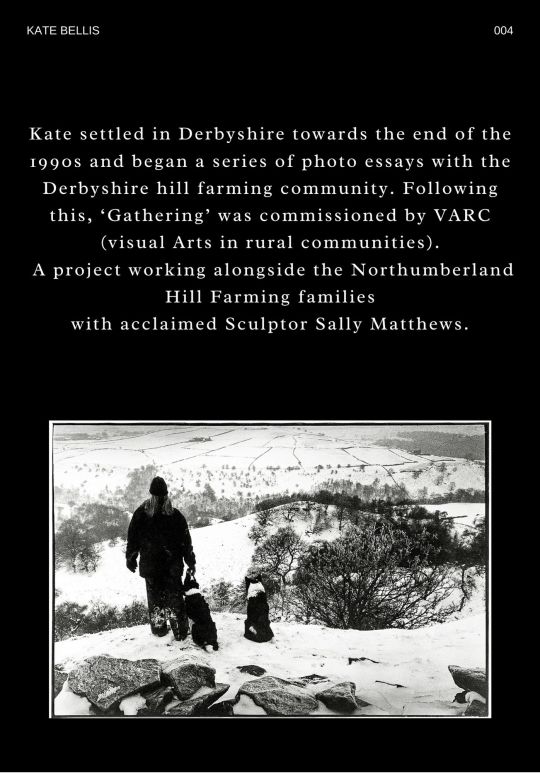

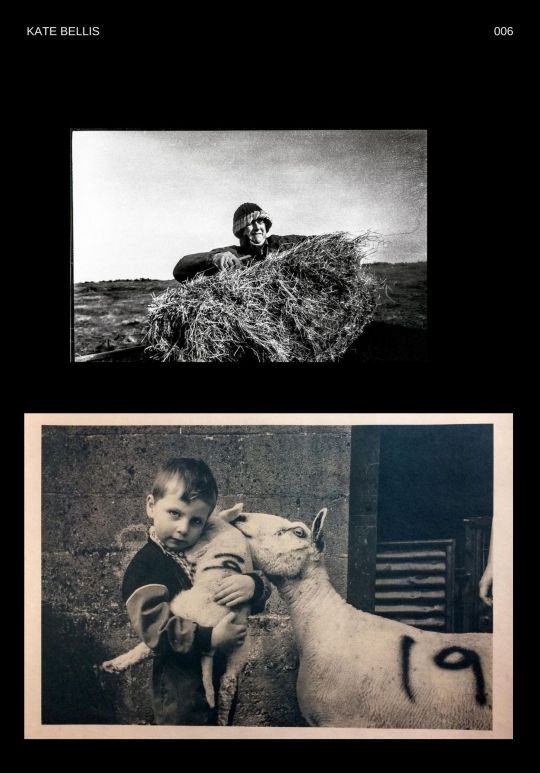
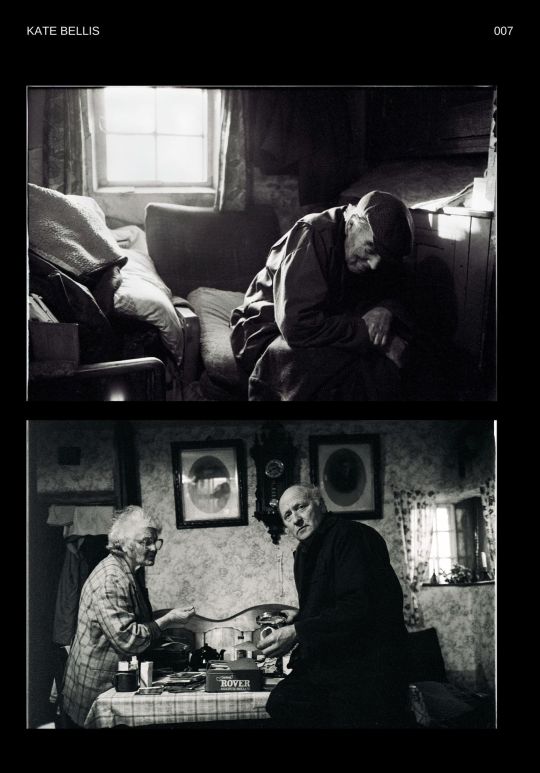

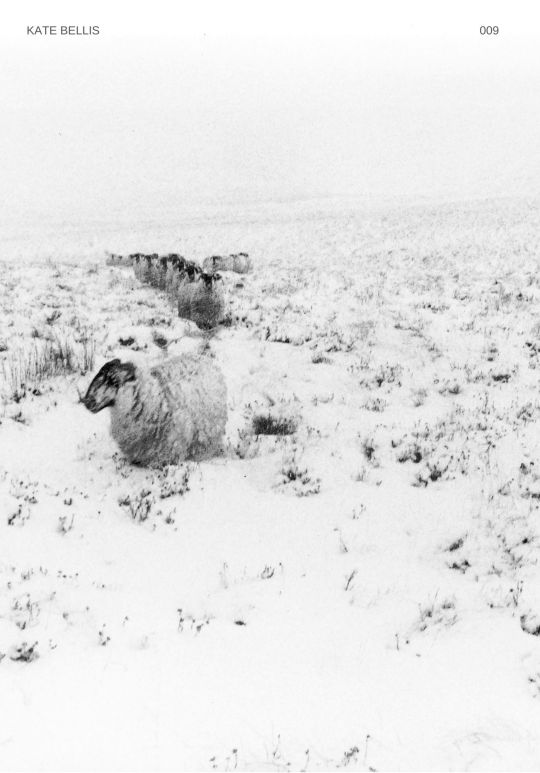
Kate Bellis was born in1969 and spent her childhood on a small farm in Devon. At the age of 17 she decided to leave this isolated rural environment and study photography at Nottingham Trent University, from where she graduated in 1991 with a BA(Hons) degree. In 1992 she was an award winner at the Observer Young Photojournalist of the Year Competition. This gave her the chance to travel across China and into Tibet. The article that came from this work was published in the Independent on Sunday magazine. For several years, before becoming a mum, Kate travelled widely with her Leica camera, from Ireland to India, Uganda to Kurdistan. These articles and commissions often dealt with people and cultures that were in some way under threat, and with the strong relationship to the land around them. Kate settled in Derbyshire towards the end of the 1990s and began a series of photo essays with the Derbyshire hill farming community. Following this, ‘Gathering’ was commissioned by VARC (visual Arts in rural communities). A project working alongside the Northumberland Hill Farming families with acclaimed Sculptor Sally Matthews. The exhibitions that came from the Derbyshire work and ‘Gathering’ have toured widely, reaching both rural and urban audiences, nationally and abroad. EarthBound is Kate’s latest collaborative project, which is in partnership with the Natural History Museum in London and will be touring nationally over the next few years. www.earthboundproject.co.uk Kate has published three books, ‘On The Edge’ (2001) ‘Gathering’ (2005) and HILL (2018) Her images have been published in many national and international newspapers and magazines, including the Guardian, The Times, The Independent on Sunday and the American photo Review and Black and White Photography Magazine. Kate lives with zoologist, Professor Karim Vahed , their Son Gabriel, and a menagerie of furred and feathered beasts. Their home is a very old stone cottage at the bottom of a steep wooded track on the side of a hill near Wirksworth in the Derbyshire Peak District.
10 notes
·
View notes
Text
Heading: King Freddie of Buganda: A Hard Lesson in Friendship and Power
I remember it clearly: sometime in the mid-seventies, while studying at Eton College, I stumbled upon a British newspaper story that left me chilled to the bone. It was about Sir Edward Frederick Mutesa II, known to many as “King Freddie” of Buganda. Born on 19 November 1924 and crowned as the Kabaka of Buganda in 1939, he had once moved effortlessly through the corridors of British high society. Knighted by Queen Elizabeth II, commissioned as an officer in the Grenadier Guards, he was a man who could walk into any exclusive London club and command immediate respect. Later, as the first President of independent Uganda (from 9 October 1963 to 2 March 1966), he seemed destined for lasting greatness.
But by the late 1960s, after a violent fallout with then-Prime Minister Milton Obote, King Freddie was forced to flee Uganda. He slipped into exile in London in 1966, no longer a toast of empire but a man living in obscurity and near-poverty. He died there on 21 November 1969 in a modest flat in Rotherhithe—reduced to near anonymity, abandoned by the very British elites who had once embraced him.
I was just seventeen when I read this. The lesson hit me like a hammer to the chest: friendships forged in the glow of power can vanish the moment the lights go out. As I sat in that hot Eton dining hall, surrounded by faces I assumed were my friends, I wondered if I too might one day be cast aside. If the currency of my worth ever depreciated, would those who hovered near suddenly vanish into the London fog, just as they had for King Freddie?
Back then, Nigeria in the 1970s was thriving—thanks to the oil boom, champagne seemed to flow like water, and American and European businessmen were thick on the ground in Lagos. Around 1974, one Nigerian Naira fetched about US$1.52, a currency so respected you barely needed visas for travel across Europe. Our passports opened doors, not raised eyebrows. No one whispered “scam” or “fraud” when they heard where we came from. We were the new kids on the global block, courted, wined, and dined. It felt like it would never end.
Today, of course, that golden era seems like a lifetime ago. The Nigerian economy buckled under mismanagement, and the Naira’s strength evaporated. Reputations got dragged through the mud. The so-called friends once clamoring around me have long since faded into silence. Is it simply physical distance—or is it the stench of lost leverage, no longer granting me a seat at their table?
No, I’m not naïve. I’m not heartbroken. King Freddie’s fate was my early warning. He taught me that when your worth to others is measured by your utility, their devotion is conditional and fleeting. He was once a gilded figure in British society—yet died in exile, half-forgotten and wholly abandoned. His life was a cautionary tale I’ve carried with me ever since, a reminder that true friendship is not founded on power, position, or currency. It endures or fails on the strength of human character alone.
#KingFreddie #Buganda #UgandaHistory #BritishColonialism #EtonMemories #Nigeria1970s #LostAllies #FriendshipAndPower #ExileStories #HistoryLessons
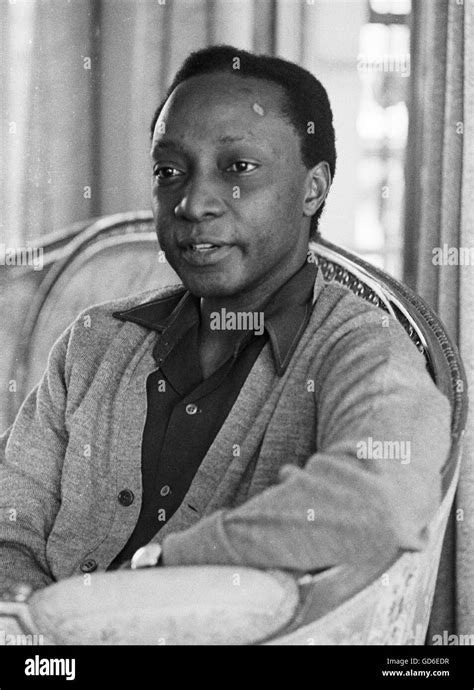
0 notes
Text
Understanding UPSC Exam Eligibility and Qualifications: A Guide by AKS IAS Academy
The Union Public Service Commission (UPSC) Civil Services Examination (CSE) is one of the most prestigious and challenging exams in India. Aspiring candidates often have numerous questions about the eligibility criteria and qualifications required to appear for this exam. In this blog, AKS IAS Academy provides a comprehensive overview to help you understand the prerequisites for embarking on your journey towards becoming a civil servant.
Basic Eligibility Criteria
Nationality:
For the Indian Administrative Service (IAS) and Indian Police Service (IPS), a candidate must be a citizen of India.
For other services, candidates must be either:
A citizen of India, or
A subject of Nepal or Bhutan, or
A Tibetan refugee who came to India before January 1, 1962, with the intention of permanently settling in India, or
A person of Indian origin who has migrated from Pakistan, Myanmar, Sri Lanka, Kenya, Uganda, Tanzania, Zambia, Malawi, Zaire, Ethiopia, or Vietnam with the intention of permanently settling in India.
Educational Qualifications:
A candidate must hold a Bachelor's degree from a recognized university.
Candidates who have appeared for the qualifying examination and are awaiting results are also eligible to apply, provided they submit proof of passing the exam along with the application for the Main Examination.
Professional and technical qualifications recognized by the Government as equivalent to professional and technical degrees are also acceptable.
Candidates with MBBS degrees or other medical qualifications but who have not yet completed their internship are also eligible, subject to certain conditions.
Age Limit:
The minimum age limit is 21 years, and the maximum is 32 years as of August 1 of the examination year.
Age relaxation is available for various categories:
Up to 5 years for SC/ST candidates.
Up to 3 years for OBC candidates.
Up to 5 years for ex-servicemen including Commissioned Officers and ECOs/SSCOs who have rendered at least five years of Military Service.
Up to 10 years for candidates with benchmark disabilities (PwBD).
Number of Attempts:
General category candidates: 6 attempts
OBC candidates: 9 attempts
SC/ST candidates: Unlimited attempts up to the age limit
PwBD candidates: 9 attempts for general and OBC candidates, unlimited for SC/ST candidates
Important Points to Consider
Physical Standards: Candidates must be physically fit according to physical standards for admission to the Civil Services Examination as per guidelines given in the rules for the examination.
Reservations: There are provisions for reservations in both the number of attempts and the age limit for candidates belonging to certain categories such as SC, ST, OBC, and PwBD. It is crucial to check the latest notifications for detailed information regarding reservations.
Preparation Tips by AKS IAS Academy
Start Early and Plan Ahead: The UPSC syllabus is vast and requires a well-structured study plan. Starting early allows you to cover the syllabus thoroughly and have ample time for revisions.
Understand the Exam Pattern: Familiarize yourself with the exam pattern, which includes three stages: Prelims, Mains, and Interview. Each stage has its own structure and requires specific preparation strategies.
Current Affairs: Stay updated with current affairs by reading newspapers, following credible news sources, and utilizing current affairs magazines. This is crucial for both Prelims and Mains.
Choose the Right Optional Subject: Selecting an optional subject that aligns with your interests and academic background can significantly impact your performance in the Mains examination.
Practice and Revision: Regular practice of answer writing, taking mock tests, and revising frequently are key to success. This helps in time management and improves your writing skills.
Guidance and Mentorship: Joining a reputable coaching institute like AKS IAS Academy can provide structured guidance, study material, and mentorship to help you navigate through the preparation journey efficiently.
Conclusion
Meeting the eligibility criteria and understanding the qualifications required for the UPSC CSE is the first step towards your goal of becoming a civil servant. AKS IAS Academy is dedicated to providing you with the necessary resources and guidance to excel in this esteemed examination. Stay focused, be persistent, and maintain a disciplined approach to your preparation. Remember, every great journey begins with a single step, and understanding the eligibility criteria is that crucial first step.
For more detailed guidance and personalized coaching, visit AKS IAS Academy and embark on your journey to success.
0 notes
Text
Green & Granstrom presents: "Only Summer"
Is a collaboration between songwriters Lars Brundin, Herbert Tinz, Jimmy Granstrom and Robert Gould.

youtube
Lars Brundin is a singer/songwriter whose songs have been frequently played on P4 Malmöhus, one of Sweden's largest regional radio stations.
His debut album Hotel Royal got a rave review by "Expressen", which is one of Sweden's largest newspapers.
For "Only Summer", Jimmy Granstrom and Robert Gould wrote brand new English lyrics to Brundin's and Tinz's previous Swedish release "Alltid sommar (där hon går)".
The vocals were recorded by Leyon Green, who's also the voice behind Green & Granstrom's previous single "Stranger With My Face".
Follow Green & Granstrom in Spotify:
BIO
"Green & Granstrom" is a collaboration between singer Leyton Green and Swedish songwriter "Jimmy Granstrom". Their previous single "Stranger With My Face" has been played on the radio in the U.S., England, Italy, Sweden, Mexico and Uganda.
The music for the song was written by Omri Lahav, whose writing credits include the soundtracks for the documentary “Quiet Explosions” and the short film “Over My Dead Body”, which were long listed for Best Original Score for this year’s Oscars and nominated for an Emmy, respectively, as well as featured in the Cannes Festival in May 2022. On "Only Summer", Jimmy Granstrom and Robert Gould wrote new lyrics for Lars Brundin's Swedish song "Alltid sommar (där hon går)" with music by Lars and Herbert Tinz. The original Swedish version has been played on P4 Malmöhus, which is one of the largest regional radio stations in Sweden.
0 notes
Text

Beginning on April 7, 1994, and lasting until mid-July, the Rwandan Genocide was the government-mandated killing of Tutsis and Hutu political moderates. Having commenced in the capital city of Kigali, the violence spread rapidly throughout the Rwandan countryside where, in less than 100 days, an estimated 20 percent of the Tutsi population of Rwanda was slain.
In 1959 a Belgian-backed Hutu coup d’état deposed the Tutsi monarch, King Kigeli V Ndahindurwa, prompting an estimated 130,000 Tutsi civilians to flee to neighboring Burundi, Tanzania, and Uganda amid anti-Tutsi violence by the Hutu. Proclaiming their right to return, in 1987 Ugandan Tutsi refugees formed the Rwandan Patriotic Front, which included a formidable military wing.
On October 21, 1993, neighboring Burundi’s first democratically-elected president Melchior Ndadaye, a Hutu, was assassinated by members of the Tutsi-dominated Burundi military. Consequently, ethnic relations in Rwanda dramatically deteriorated. Then, on April 6, 1994, Rwandan President Habyarimana’s plane was shot down by unknown assailants, triggering the genocide.
Within hours of the attack, death orders were issued by the RTLM, the Kangura newspaper, and other government-run media in Rwanda, resulting in the systematic killing of prominent Tutsi politicians in the capital city of Kigali. The murderous rampage then spread to the countryside, where in a little over three months an estimated 800,000 Tutsi men, women, and children were indiscriminately raped, tortured, and killed by Rwandan Hutu militiamen. Though United Nations (UN) peacekeeping troops were initially deployed, they were withdrawn as the violence precipitously escalated.
The genocide ended in July 1994 when armed Tutsi rebels invaded from neighboring Burundi, defeating the Hutus and halting any further killing. At the time of the massacre, the Hutu comprised around 85% of the total Rwandan population. #africanhistory365 #africanexcellence
1 note
·
View note
Text
The Opinion: The Deafening Silence,A Call for Accountability in Uganda.
By Makana Kennedy Ndyamuhaki- Updated at 08:05 EAT on Monday 5th March 2024. Makana Kennedy Ndyamuhaki In the midst of the deafening silence that has engulfed our nation’s political landscape, it becomes increasingly evident that something is gravely amiss. The absence of headlines in our newspapers, the reluctance of journalists to speak out, and the eerie quiet from our parliamentary…

View On WordPress
0 notes
Text
10 things you need to know Thursday morning - OtownGist
Good morning! Here is today’s summary from Nigerian Newspapers: 1. Following the suspension of accreditation and evaluation of degree certificates from Benin Republic and Togo, the Federal Government has said sanctions would be extended to more countries like Uganda, Kenya and Niger Republic. Read the full article
0 notes
Text
BBC 0441 5 Dec 2023
12095Khz 0358 5 DEC 2023 - BBC (UNITED KINGDOM) in ENGLISH from TALATA VOLONONDRY. SINPO = 55233. English, dead carrier s/on @0358z then ID@0359z pips and Newsroom preview. @0401z World News anchored by Neil Nunes. The United States said on Monday it was too soon to make a final judgment on whether Israel was doing enough to protect civilians in Gaza despite some improvements and that it expected Israeli forces not to strike zones they have identified as safe. Israel's military has ordered the evacuation of a fifth of the main city in southern Gaza, as it expands its ground offensive against Hamas. In Gaza City, an unconfirmed report says 50 people were killed when Israeli air strikes hit two schools. According to the Palestinian news agency Wafa, they died in schools sheltering displaced people in the city's Daraj neighbourhood. A former Tesla employee has told the BBC he believes the technology powering the firm's self-driving vehicles is not safe enough to be used on public roads. Lucasz Krupski leaked data, including customer complaints about Tesla's braking and self-driving software, to German newspaper Handelsblatt in May. Thousands of Māori protesters took to the streets across New Zealand on Tuesday morning, objecting to policies of the new government that Māori say will unravel decades of indigenous progress. The new government recently announced it would dial back the use of Māori language in government organisations, and scrap anti-smoking legislation and the Māori Health Authority at a time when health issues, including lung cancer, disproportionately impact Māori. The Washington Post has reported that The Associated Press, USA Today and Northeastern University have been compiling their database of mass gun killings since 2006, making 2023 the worst year on record. The United States on Monday expanded a visa restriction policy on Ugandan officials to include those it believes are responsible for undermining democracy and repressing marginalized groups in Uganda, while also announcing a new visa restriction policy for officials in Zimbabwe. U.S. Secretary of State Antony Blinken announced the visa restrictions and mentioned, among others, the marginalization of groups like the LGBT community in Uganda and civil society advocates in Zimbabwe. Blinken's statements did not name any official. COP28 President Sultan al-Jaber is facing a backlash over his claim that there is "no science" behind calls for a phase out of fossil fuels. Many believe the success of the U.N. climate conference hinges on a collective agreement to bring an end to the fossil fuel era. Speaking at a news conference on Monday, al-Jaber said his team "very much believe and respect the science." A YouTuber accused of deliberately crashing his plane to get a boost in views has agreed to plead guilty to obstructing a federal investigation, the US Department of Justice announced. Trevor Jacob, 29, faces up to 20 years in federal prison after he purposely destroyed the wreckage of the small single-engine plane that he crashed in California’s Los Padres national forest in 2021, according to a statement from the US attorney’s office. @0406z "The Newsroom" begins. 250ft unterminated BoG antenna pointed E/W w/MFJ-1020C active antenna (used as a preamplifier/preselector), Etón e1XM. 250kW, beamAz 315°, bearing 63°. Received at Plymouth, United States, 15359KM from transmitter at Talata Volonondry. Local time: 2158.
0 notes
Text

Portrait of Extinction. Head on Portrait Awards 2023.
Field rangers from the Uganda Wildlife Authority pose in front of over 12 tonnes of metal snares confiscated in just one year in Murchison Falls national park. The snares are a cheap and effective method of poaching wildlife for sophisticated criminal syndicates who often exploit impoverished communities to supply a booming global black market for wildlife.
Photograph: Adam Oswell. Courtesy Guardian Newspaper #portrait #extinction
0 notes
